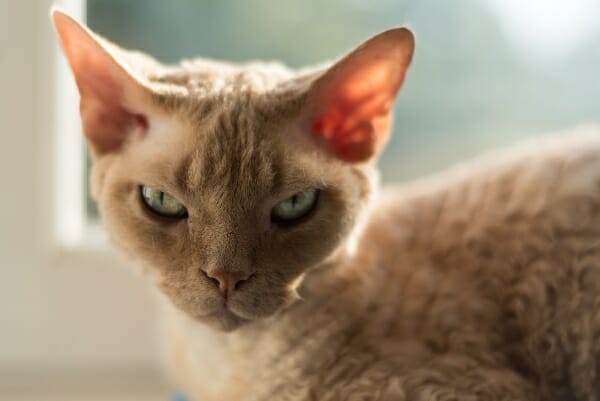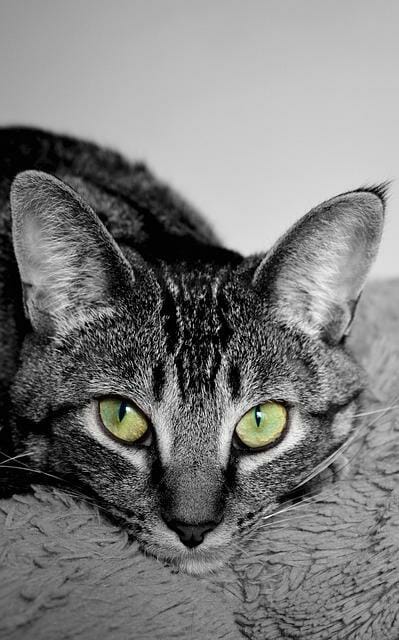Why Does My Devon Rex Bite: Reasons Why Devon Rex Bite and How to Deal With It
Devon Rex cats are known for being highly active and playful, and they may use their teeth to play with their owners, confirmed by the Thornleigh Veterinary Hospital. While this behavior is usually harmless, it can be painful if the biting is too hard. Providing plenty of toys and playtime to satisfy their high energy levels is important to address biting behavior in your Devon Rex. Avoid using your hands or feet as toys, which can encourage biting behavior.


Table of Contents
Causes of Biting of a Devon Rex
Attention-Seeking
Attention-seeking behavior in cats is a common issue that many pet owners face. Make sure your cat is getting enough attention throughout the day. Set aside dedicated playtime and interactive sessions to keep your cat engaged and stimulated.
If your cat engages in attention-seeking behavior, such as meowing excessively or pawing at you, try ignoring them. Don’t give in to the behavior by petting or playing with your cat, as this can reinforce the behavior. For example, when your cat displays positive behaviors, such as playing with toys or using their scratching post, reward them with praise and treats. This will help reinforce the desired behavior and discourage attention-seeking behavior.
Provide your cat with plenty of toys, scratching posts, and other environmental enrichment to keep them entertained and mentally stimulated. If your cat is particularly needy, consider getting them a companion to play and interact with. However, introduce them slowly and monitor their interactions to ensure they get along well.
Fear, Stress, or Pain
If your Devon Rex cat is biting, it’s possible that fear, stress, or pain. A fearful cat may exhibit behaviors such as cowering, hiding, or hissing. They may also have a tense body posture and dilated pupils. For example, a stressed cat may show signs of overgrooming, refusing to eat, or avoiding social interaction. They may also exhibit repetitive behaviors, such as pacing or excessive grooming.
A cat in pain may show signs such as vocalizing, limping, or avoiding certain movements or activities. They may also show a reluctance to be touched or handled. If you suspect that your cat may be experiencing fear, stress, or pain, it’s important to consult a veterinarian. They can help diagnose and treat any underlying medical issues and advise managing stress or fear-related behavior.
Frustration
Frustration can also cause biting behavior in cats, including Devon Rex cats. A frustrated cat may become agitated or restless, pacing or wandering around the house. A frustrated cat may exhibit destructive behavior, such as scratching furniture or walls. They may meow excessively, make other vocalizations, and engage in obsessive behaviors, such as excessive grooming or compulsive scratching.
Predatory Instincts
Predatory instincts are innate in cats, including Devon Rex cats. These instincts can cause them to exhibit biting behavior, particularly during playtime. For example, cats may stalk their prey, crouching and slowly creeping up on their target. They may pounce on their target suddenly and without warning, chase their target, particularly if it is moving quickly, and bite their target, particularly around the neck or head.
Medical Issues
Devon Rex cats are generally healthy, but like all cats, they can develop medical issues. Here are some common medical issues that Devon Rex cats may experience:
- Skin problems: Devon Rex cats are prone to skin problems, such as excessive oil production and seborrheic dermatitis. These conditions can cause skin irritation, itching, and hair loss.
- Respiratory problems: Devon Rex cats may be prone to respiratory problems like asthma and bronchitis. Symptoms may include coughing, wheezing, and difficulty breathing.
- Dental problems: Devon Rex cats may be more prone to dental issues, such as periodontal disease, due to their unique dental structure.
- Gastrointestinal issues: Devon Rex cats may experience digestive issues, such as vomiting and diarrhea, due to dietary sensitivities or allergies.
- Hypertrophic cardiomyopathy (HCM): HCM is a common heart condition in cats, and Devon Rex cats may be more prone to developing it.
Know the Symptoms of a Biting Habit
Aggression
Aggression is a serious behavior problem in cats, including Devon Rex cats, and can manifest as biting behavior. A cat may exhibit these vocalizations as a warning or a sign of aggression. They may aggressively lunge or attack people, cats, or animals, their hair may stand on end, and their ears may be flattened against their head, indicating a sign of aggression.


A cat’s tail may twitch or lash back and forth rapidly, which can be a sign of aggression. They may hunch their back, puff out their fur, and tuck their head down, which can signify defensive aggression.
Unpredictability
Unpredictable biting behavior in cats, including Devon Rex cats, can be concerning and frustrating for pet owners. For example, cats may bite unpredictably if they feel threatened or anxious. This can be triggered by changes in their environment, new people or animals in the household, or other stressors.
Some medical conditions, such as dental problems or skin irritations, can cause a cat to bite unpredictably due to pain or discomfort. However, they may bite unpredictably during playtime, particularly if they use their teeth and claws to play with a human or another animal.
Damage to Furniture or Other Objects
Cats, including Devon Rex cats, have a natural urge to scratch and bite, which can lead to damage to furniture and other objects in your home. Cats need to scratch to keep their claws healthy and mark their territory. Providing a scratching post or two in your home can help redirect your cat’s scratching behavior away from furniture and other objects. Please ensure the scratching post is sturdy and tall enough for your cat to stretch out their body fully.
You can discourage your cat from scratching furniture and other objects using deterrents such as double-sided tape or a citrus spray. You can also cover furniture with a throw or use plastic sheeting to protect surfaces from scratches. Biting behavior in cats can also be a form of play. For example, providing your cat with plenty of toys, such as catnip-filled mice or wand toys, can help redirect their biting behavior away from furniture and other objects.
When it comes to furniture damage, both Devon Rex and Siamese cats have the potential to cause mischief. However, the Devon Rex is often known for its high energy levels and mischievous tendencies, which may lead to more frequent instances of scratching or climbing on furniture. Siamese cats, on the other hand, are generally more graceful and less likely to engage in destructive behavior towards furniture. Nevertheless, each cat’s behavior can vary, and providing appropriate scratching posts and toys can help redirect their natural instincts and protect your furniture.
Regularly trimming your cat’s claws can help reduce damage to furniture and other objects. Be sure to use proper nail trimmers and avoid cutting them quickly, which can be painful for your cat. Cats enjoy biting and chewing on objects. Providing alternative objects to chew on, such as soft toys or rawhide chews, can help redirect their biting behavior away from furniture and other objects.
Fearful Behavior
Devon Rex cats, like any other animal, can display fearful behavior. If your cat is hiding more than usual, this may be a sign that they are feeling fearful or anxious. Cats may hide under furniture, in closets, or other secluded areas of your home. A fearful cat may avoid interaction with people or other animals in your household. They may retreat to another room or refuse to come out of hiding.


Fearful cats may display aggressive behavior, such as hissing, growling, or biting. This is usually a defensive response to perceived threats. They may also experience changes in their litter box behavior. For example, they may avoid using the litter box or start eliminating outside of the box due to stress.
Tips to Stop Your Devon Rex From Biting
- Determine the cause: Before addressing your cat’s biting behavior, it’s important to determine the underlying cause. Common biting causes include fear, aggression, frustration, or playfulness. Observe your cat’s behavior to see if you can identify any triggers or patterns.
- Redirect the behavior: If your Devon Rex cat is biting out of playfulness, redirect their behavior to an appropriate toy or object. Provide your cat with plenty of toys and scratching posts to entertain and engage them.
- Use positive reinforcement: Reward your cat for good behavior, such as using their scratching post or playing with their toys, with treats or affection. This will help reinforce positive behavior and discourage biting.
- Discourage bad behavior: If your Devon Rex cat bites you or other objects, discourage this behavior with a firm “no” or a loud noise. You can also gently redirect their attention to a toy or object.
- Provide appropriate outlets for energy: Devon Rex cats are active and playful and need plenty of exercise and stimulation. Ensure your cat has access to toys, scratching posts, and plenty of opportunities to play and explore.
- Consult a veterinarian or animal behaviorist: If your cat’s biting behavior persists or is severe, it’s important to consult a veterinarian or animal behaviorist. They can help determine the underlying cause of your cat’s behavior and develop a behavior modification plan to help stop the biting.
